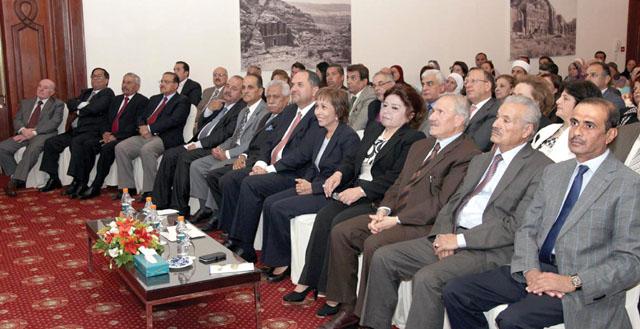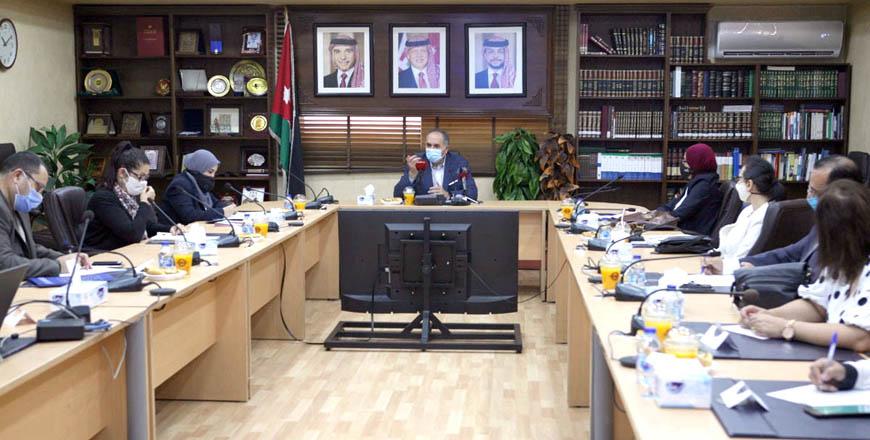You are here
Forum participants call for protecting those vulnerable to human trafficking
By Rana Husseini - Dec 27,2014 - Last updated at Dec 27,2014
AMMAN — Experts and officials gathered on Saturday to address human trafficking in Jordan and called for intensified efforts to ensure protection for the vulnerable in such cases.
“We want to reach a stage where our society is aware of the dangers of human trafficking and realises the importance of prevention, protection and care for victims of human trafficking,” said Senator Taghreed Hikmat, president of the Jordanian Combating Modern Day Slavery and Human Trafficking (JCMST) Association.
“Finding a solution for this problem starts with admitting that we have a problem and then taking the appropriate and gradual measures to eliminate its growth,” Hikmat told attendees at the first Jordanian forum titled National Efforts to Combat Human Trafficking: Realities and Aspirations.
Organised by JCMST in cooperation with UNHCR, the Anti-Human Trafficking Unit at the Public Security Department and other partners, the forum aimed to raise the level of awareness of the plight of human trafficking victims among individuals working in security agencies as well as governmental and non-governmental organisations, according to Hikmat.
The senator highlighted the need to release an annual report on human trafficking in the Kingdom and prepare a code of ethics to deal with victims.
Deputy Secretary General at the Ministry of Social Development Abdullah Smeirat delivered a speech on behalf of Minister of Social Development Reem Abu Hassan.
Although Jordan accomplished a lot in combating human trafficking, “we strive to achieve more by increasing our scientific knowledge of the reasons, the consequences and ways to prevent” the phenomenon, Abu Hassan added.
The minister called for providing accurate data and information on human trafficking victims and increasing coordination and collaboration among organisations working in this field.
Touching on the plight of Syrian refugees in Jordan, Brig. Gen. Waddah Hmoud, director of the Syrian refugee affairs department, said the Jordan Armed Forces-Arab Army is undertaking additional tasks and duties to respond to the situation.
There are around 1.4 million Syrians in Jordan, 52 per cent of whom are 18 years old and under, while 51 per cent are women, according to Hmoud.
“The majority of human trafficking victims are the most vulnerable — like women, children and the elderly — who are taken advantage of for reasons related to poor economic conditions, natural disasters, armed conflicts or the desire for a better life,” the official said.
The JCMST was established in June 2014 with the aim of bringing to light the dangers of human trafficking and slavery in all their forms, and facilitating solutions for these issues worldwide.
Modern-day human trafficking takes the shape of forced labour, mobilisation of children, forced marriage and trafficking in organs, Hikmat said, noting that human trafficking is currently one of the main violations of human rights.
Last year, Jordan reported 17 human trafficking cases involving 54 males and 27 females, according to a report prepared by the National Anti-Trafficking Committee.
The number of victims of human trafficking worldwide annually reaches 21 million.
Earlier this year, the Council of Ministers approved a decision to turn a Social Development Ministry building into a shelter for victims of human trafficking. The 2,000-square-metre ministry building is currently under rehabilitation for this purpose.
Jordan enacted an Anti-Human Trafficking law in March 2009.The Kingdom has also ratified the UN Convention Against Transnational Organised Crime and its supplemental Protocol to Prevent, Suppress and Punish Trafficking in Persons, Especially Women and Children.
Related Articles
A newly launched local society seeks to bring to light the dangers of human trafficking and slavery in all its forms, and to facilitate solutions for these issues worldwide.
AMMAN — The national anti-human trafficking committee on Thursday approved the National Strategy for Anti-Human Trafficking for 2023-2026.&n
AMMAN — Minister of Justice Bassem Talhouni, head of the national anti-human trafficking committee, on Saturday met with representatives fro













